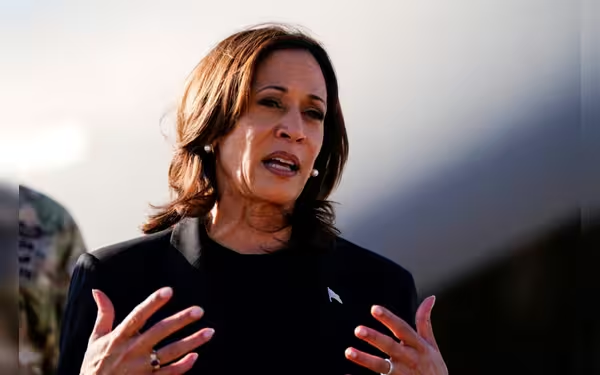Saturday, November 16, 2024 07:31 PM
Harris Reaffirms U.S. Support for Gaza Ceasefire Amid Ongoing Conflict
- Harris emphasizes U.S. pressure for Gaza ceasefire.
- Ongoing humanitarian crisis in Gaza raises concerns.
- Israel's military actions impact regional stability.
 Image Credits: thefrontierpost
Image Credits: thefrontierpostKamala Harris reiterates U.S. commitment to Gaza ceasefire amid escalating humanitarian crisis and regional instability.
In recent weeks, the ongoing conflict in Gaza has drawn significant attention from global leaders, particularly from the United States. The situation escalated dramatically on October 7, 2023, when Hamas launched an attack on Israel, resulting in the deaths of approximately 1,200 individuals and the abduction of around 250 hostages. In response, Israel initiated a military campaign against Hamas, which has led to a staggering death toll of nearly 42,000 Palestinians, according to local health authorities. This conflict has not only caused immense suffering but has also raised serious humanitarian concerns, with millions displaced and facing dire conditions.
Amidst this turmoil, U.S. Vice President Kamala Harris has reiterated Washington's commitment to advocating for a ceasefire in Gaza. In a recent interview on CBS's "60 Minutes," Harris emphasized that the U.S. will continue to exert pressure on Israel and other key players in the Middle East to facilitate a ceasefire agreement. She described the diplomatic efforts with Israel as "an ongoing pursuit," highlighting the importance of maintaining a strong alliance between the American and Israeli people.
Harris faced a challenging question regarding the closeness of the U.S. relationship with Israeli Prime Minister Benjamin Netanyahu. Instead of directly addressing the nature of their alliance, she focused on the broader connection between the two nations, stating, "I think with all due respect the better question is do we have an important alliance between the American people and the Israeli people and the answer to that question is yes." This response underscores the complexity of international relations, where alliances can be both strategic and nuanced.
While Harris reaffirmed the U.S. support for Israel's right to defend itself against threats from Iran and militant groups like Hamas and Hezbollah, she also acknowledged the need for diplomatic engagement. "We’re not going to stop in terms of putting that pressure on Israel and in the region including Arab leaders," she asserted. However, critics argue that the U.S. has not utilized its leverage effectively, particularly in light of the ongoing humanitarian crisis in Gaza.
Despite President Joe Biden's proposed three-phase ceasefire plan laid out on May 31, a resolution between Israel and Hamas remains elusive. The gaps in negotiations, particularly concerning the exchange of hostages and prisoners, have hindered progress. Additionally, Israel's insistence on maintaining a military presence in certain areas complicates the situation further.
The recent violence has not only affected Gaza but has also spilled over into Lebanon, where Israeli military actions have resulted in hundreds of casualties and significant displacement. This broader regional instability raises questions about the long-term implications for peace in the Middle East.
As the world watches the developments in Gaza, it is crucial to recognize the human cost of this conflict. The ongoing violence and suffering of innocent civilians call for urgent action and a renewed commitment to peace. The international community must come together to advocate for a ceasefire and address the underlying issues that perpetuate this cycle of violence. Only through dialogue and cooperation can a lasting solution be achieved, ensuring safety and dignity for all affected by this tragic conflict.













